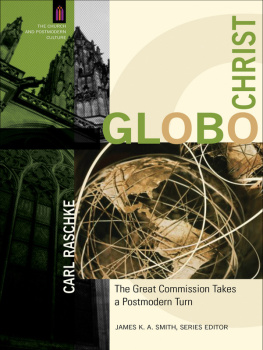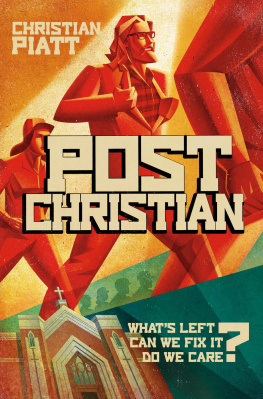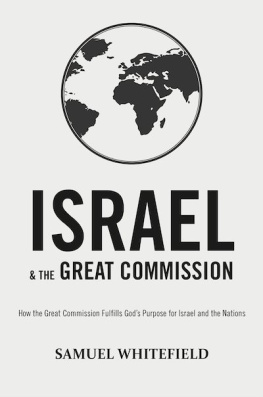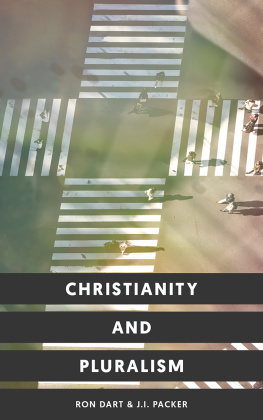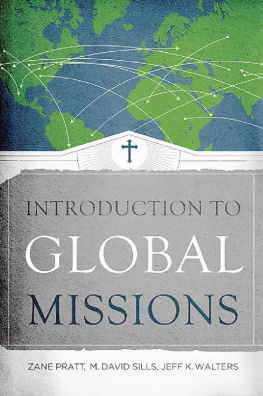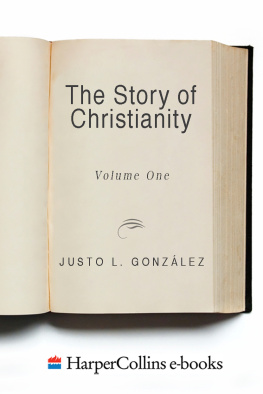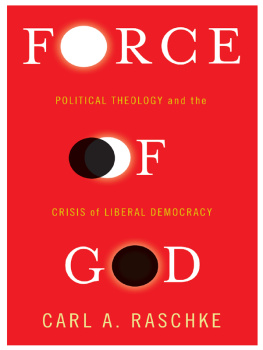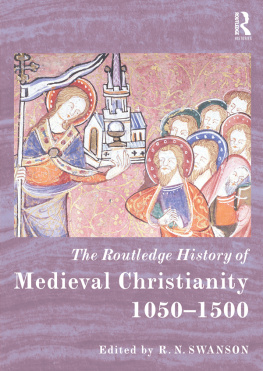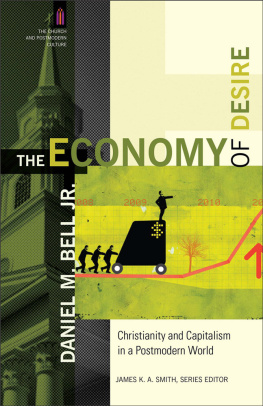To the memory of Douglas Strube,
whose inestimable friendship, missionary heart,
unflagging loyalty,
and heroic but unsuccessful struggle against cancer
inspired me to write GloboChrist
Contents
Current discussions in the churchfrom emerging postmodern congregations to mainline missional congregationsare increasingly grappling with philosophical and theoretical questions related to postmodernity. In fact, it could be argued that developments in postmodern theory (especially questions of post-foundationalist epistemologies) have contributed to the breakdown of former barriers between evangelical, mainline, and Catholic faith communities. Postliberalisma related effect of postmodernismhas engendered a new, confessional ecumenism wherein we find nondenominational evangelical congregations, mainline Protestant churches, and Catholic parishes all wrestling with the challenges of postmodernism and drawing on the culture of postmodernity as an opportunity for rethinking the shape of our churches.
This context presents an exciting opportunity for contemporary philosophy and critical theory to hit the ground, so to speak, by allowing high-level work in postmodern theory to serve the churchs practiceincluding all the kinds of congregations and communions noted above. The goal of this series is to bring together high-profile theorists in continental philosophy and contemporary theology to write for a broad, nonspecialist audience interested in the impact of postmodern theory on the faith and practice of the church. Each book in the series will, from different angles and with different questions, undertake to answer questions such as What does postmodern theory have to say about the shape of the church? How should concrete, in-the-pew and on-the-ground religious practices be impacted by postmodernism? What should the church look like in postmodernity? What has Paris to do with Jerusalem?
The series is ecumenical not only with respect to its ecclesial destinations but also with respect to the facets of continental philosophy and theory that are represented. A wide variety of theoretical commitments will be included, ranging from deconstruction to Radical Orthodoxy, including voices from Badiou to iek and the usual suspects in between (Nietzsche, Heidegger, Levinas, Derrida, Foucault, Irigaray, Rorty, and others). Insofar as postmodernism occasions a retrieval of ancient sources, these contemporary sources will be brought into dialogue with Augustine, Irenaeus, Aquinas, and other resources. Drawing on the wisdom of established scholars in the field, the series will provide accessible introductions to postmodern thought with the specific aim of exploring its impact on ecclesial practice. The books are offered, one might say, as French lessons for the church.
To shamelessly lift a line from a sequined and bell-bottomed Barbara Mandrell, Carl Raschke was pomo long before pomo was cool. Since the mid-1970s he has been on the vanguard of those engaging continental theory with an interest in not only theology but also the shape of lived religion on the ground. In short, he was doing the work envisioned by the Church and Postmodern Culture series since before I even knew how to spell church. So it is a distinct honor to welcome GloboChrist as the third volume in the series, a fitting follow-up to his groundbreaking book, The Next Reformation.
Judging from the book, however, Carl might want to consider becoming a fervent devotee of remnant theologycommitted to the sense that God is present with the few who remain faithful because this little manifesto is bound to shrink the circle of friends at his next dinner party. But its strident voice, which is an equal-opportunity offender on both the left and right, is also its virtue. It is precisely his fierce independence of thought that makes Raschke such an important voice in current discussions about the shape of the churchs mission in our postmodern moment. As Raschke puts it, he is out to counter those who are giddy to believe that a new kind of Christian is simply an easier-to-get-along-with Christian (160). Contrary to those who espouse a postmodern account of mission or evangelism as a cover for engaging in transformative dialogue (or various other technical translations of kumbaya), the core argument of GloboChrist suggests that the churchs missional task in postmodernity is inevitably a vocation of conflict. The fulfillment of the Great Commission will not be without struggle, Raschke argues. Through dialogue, Muslims and Christians may come to agree on common points of their mutual Abrahamic faiths, but the differences will always outweigh the similarities. The differences make the difference (115).
Ironically, much that we get in the name of postmodern attentiveness to difference and the Other turns out to be a very timid, bland, apologetic stance that is rather embarrassed by difference and instead seeks ways, Rodney Kinglike, for us to all just get along. Indeed, much that traffics under this banner would be embarrassed by the very project of missions and evangelism. In short, postmodern valorization of difference has come to mean a veritable end of missions. But such responses are working out the very modern logic of toleration articulated by Locke, Kant, and others, whereas Raschke is articulating a more thoroughly postmodern account of mission that takes difference seriously enough to own up to the conflict it entails. In Raschkes project, Deleuze supersedes Derrida (21); his is an agonistic account of mission.
But most importantly, Raschke argues that a postmodern account of mission needs to flow from the logic of the incarnation. Just as God becomes enfleshed and contextualized in and for a particular time and a particular placeborn of a woman, under the law in the fullness of time (Gal. 4:4), suffering under Pontius Pilate so too is the church called to extend this incarnational presence. That is the nature of the missio Dei: not the communication of messages or the proliferation of programsnot even the planting of churches. It might not even be primarily about communicating some truth to those who are without it. Rather, it is about being Christ to and for the world. In a way that echoes both Kierkegaard and Bonhoeffer (fellow Lutherans in spirit with Raschke), Raschke suggests that this call to incarnational mission might require that we jettison some cherished distinctions (and fears). Incarnational ministry in a globopomo setting, he argues, means setting aside even the Christian/non-Christian distinction, particularly when being a Christian turns out to be a barrier to being Christ to one another (65). Mission is above all a project of radical translation; are we willing to let that translation escape the grammar and syntax of our eurocentric idioms?
The globopomo turn for the Great Commission is occasioned by two important realities. First, as Raschke rightly notes, postmodernism and globalization are inextricably linked. While European and North American (especially academic) discussions of postmodern theory tend to restrict it to the safe but largely sequestered environs of epistemology, in fact postmodernity is synonymous with the flattening of the world by globalization. The postmodern moment, as Raschke puts it, is a global one: Becoming postmodern means that we all, whether we like it or not, are now going global, which is what that obscure first-century sect leader from Palestine truly had in mind (25). We cant not be postmodern precisely because we cant not be global(ized). So postmodernism isnt about whether well serve fair trade coffee at our image-driven worship events aimed at the creative class in the bobo quarter of the city. Postmodernism isnt just a phenomenon of interest to the educated class of Western culture or just a topic of conversation for tenured radicals taken with continental philosophy. Rather, it is bound up with the global conflicts and reorganizations that dominate world affairs and foreign policy. The realities of postmodernism are grappled with by Amnesty International and the UN, not just the Society for Phenomenology and Existential Philosophy. And so the question of Christian faith and postmodernism is about how Christian faith can be communicated and lived out in a world of mass migration, persistent genocide, increased gaps in global wealth distribution, and the growth of global Islam.
Next page
